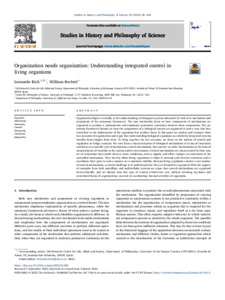Bich, Leonardo and Bechtel, William
(2022)
Organization needs organization: Understanding integrated control in living organisms.
Studies in History and Philosophy of Science, 93.
pp. 96-106.
ISSN 0039-3681
![[img]](https://philsci-archive.pitt.edu/20422/1.hassmallThumbnailVersion/Bich%2C%20Bechtel%20-%202022%20-%20Organization%20needs%20organization%20Understanding%20integrated%20control%20in%20living%20organisms.pdf)  Preview |
|
Text
Bich, Bechtel - 2022 - Organization needs organization Understanding integrated control in living organisms.pdf
Download (388kB)
| Preview
|
Abstract
Organization figures centrally in the understanding of biological systems advanced by both new mechanists and proponents of the autonomy framework. The new mechanists focus on how components of mechanisms are organized to produce a phenomenon and emphasize productive continuity between these components. The autonomy framework focuses on how the components of a biological system are organized in such a way that they contribute to the maintenance of the organisms that produce them. In this paper we analyze and compare these two accounts of organization and argue that understanding biological organisms as cohesively integrated systems benefits from insights from both. To bring together the two accounts, we focus on the notions of control and regulation as bridge concepts. We start from a characterization of biological mechanisms in terms of constraints and focus on a specific type of mechanism, control mechanisms, that operate on other mechanisms on the basis of measurements of variables in the system and its environment. Control mechanisms are characterized by their own set of constraints that enable them to sense conditions, convey signals, and effect changes on constraints in the controlled mechanism. They thereby allow living organisms to adapt to internal and external variations and to coordinate their parts in such a manner as to maintain viability. Because living organisms contain a vast number of control mechanisms, a central challenge is to understand how they are themselves organized. With the support of examples from both unicellular and multicellular systems we argue that control mechanisms are organized heterarchically, and we discuss how this type of control architecture can, without invoking top-down and centralized forms of organizations, succeed in coordinating internal activities of organisms.
Monthly Views for the past 3 years
Monthly Downloads for the past 3 years
Plum Analytics
Altmetric.com
Actions (login required)
 |
View Item |



